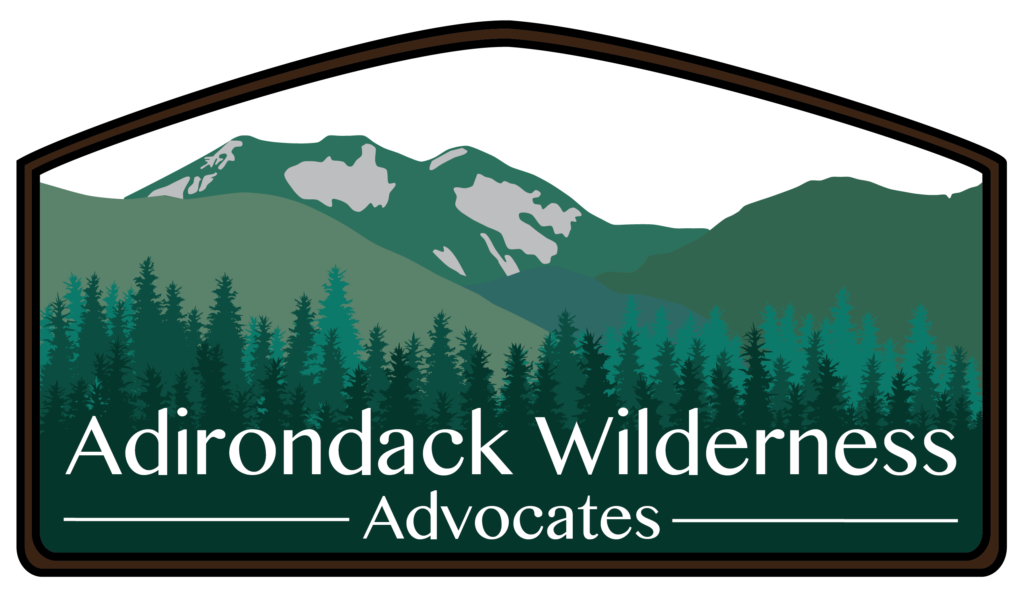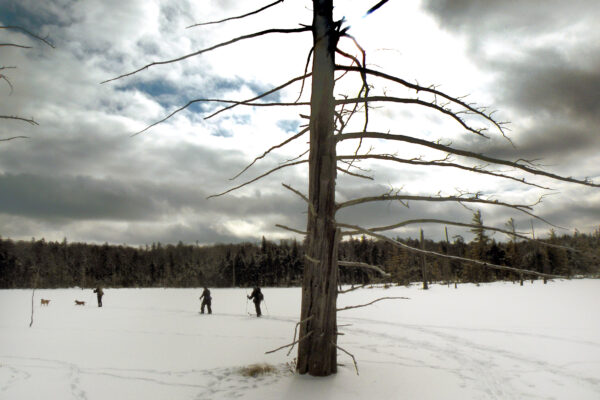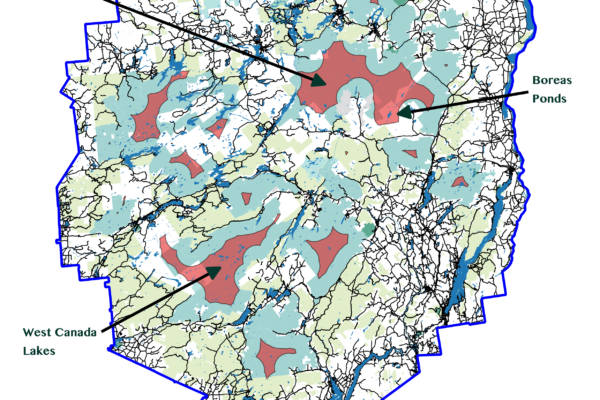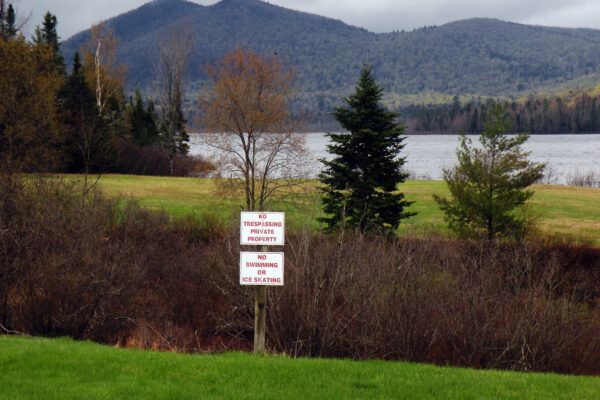I might have abandoned the idea of reaching South Pond had I not caught a glimpse of it through the trees, right at that critical moment of decision. There it was, right there at the foot of the mountain, a snowy white expanse about a quarter mile away, a remote and lonely retreat with a siren call I could not refuse. Not when I was this close.
I became resolved to continue forward—even though it had taken a full two hours just to come this short distance, and Lexie and I still had the trip back over the mountain to face, too. We had taken our time dealing with the thickets of tangled spruce and the isolated deadfalls that had been dogging us all the way up and over the mountain, one after the other. There had not been much clear walking. Ironically, near the bottom of the mountain we began to encounter a new obstacle: small but steep ledges that again forced us to adjust our course and find yet another way around. Not once since we had started up the mountain had we been able to simply proceed in a straight line.
I had never been so happy to get off a mountain. Once on the valley floor, though, we could not see the pond again until fifteen or twenty minutes later, when we emerged on the north shore, at the edge of what appeared to be a boggy area. We circled around the shoreline towards the outlet, where we found an old stone campfire ring. This was the only indication we would see that anyone had ever been here before.
South Pond is a place I knew few people had chosen to see. No trail led to it, and for most people who knew of it at all it was just a bit of blue ink on a topographic map, an abstract concept that can only take a tangible form by going there in person. This qualified it as a grail of sorts for certain people, myself included. I knew several people who had tried to reach South Pond and failed. Maps were studied, and various routes considered. So far, they had been attempting to get there and back in a single day. Time had run out without anyone getting even close, although one expedition insisted they would have made it had they only followed the right stream. I listened politely and kept my doubts to myself. I knew that South Pond had remained perfectly safe from their discovery that day, no matter what stream they had followed.
The way I saw it, remoteness must be savored. It can’t be rushed, or shoehorned to meet some artificial deadline. The very thing that makes South Pond attractive is that it is so hard to reach. To get to places like this, you need to set aside several days and take your time.
Which is what Lexie and I did this weekend. We were camping beside Lower Siamese Pond, on the other side of the mountain, having arrived the previous afternoon. It was early December, but the conditions were quite wintry: ice on the pond, snow on the ground, a harsh chill in the breeze. Our campsite had been selected more for the shelter it provided from this last factor than for the view it offered of the pond. When bushwhacking around the shore yesterday, we had hurried past several much more scenic sites. The exposure that I was sure made them such attractive places in the summer made them inhospitable now. So I found an anonymous little spot enclosed by the trees, on one of the side bays, where Lexie and I had been able to rest in relative peace. We were near the water, but out of the wind.
This morning, after a comfortable night’s sleep, I packed what we would need for the day, including the stove and the necessary accoutrements for lunch. Then I zipped up the tent and we set off around the tip of the pond. From our campsite, South Pond should have been a straightforward jaunt over County Line Mountain.
Lexie was happy to be under way, and didn’t care too much where we were going. On trips like this, her best methods of maintaining warmth are to remain curled up in my sleeping bag or to go for a hike. And thus I could easily sum up her activities this weekend. She now led the way, without getting too far ahead since without a trail she could only guess at the direction I intended to go. She needed to check my cues to see where to head next, and that meant staying constantly in sight.
We dipped down to cross the outlet of Upper Siamese Pond, and that placed us at the foot of County Line Mountain. The route I had worked out this morning would take us over one of the notches in the ridgeline, and our guide would be the mountain itself. The climbing began at a moderate grade, with what appeared to be the first of the usual obstacles to bushwhacking: random blowdown, brush, and pockets of dense spruce. This was nothing out of the ordinary, just the forest with its usual clutter.
There was only a minor amount of snow on the ground, no more than an inch or two, and nowhere near enough to require snowshoes. But it was enough to cover the entire mountain, and it imparted a strong winter-like appearance. More was falling, too, in a gentle shower that absorbed sound and seemed to cut us off even further from the civilized world. The falling snow heightened the peace that normally attends such a remote forest landscape. We were alone. Who knew how close the nearest human being was? The distance would no doubt be measured in miles.
The route we were taking had looked simple enough on the map—up one side of the ridge, down the other, and then across the flats to South Pond—but the map had not prepared me for all the idiosyncrasies of this particular forest. The blowdown, the brush, and the spruce thickets were arranged in such a curious pattern that as soon as I bypassed one obstacle we were presented with another. Or rather I was, because Lexie had little difficulty fitting through all the tight spaces that were too small for me. She’d scoot under one fallen log, for instance, but then come back and go the long way around when she saw that I wasn’t following her. We were doing an awful lot of zigzagging.
And all the while, I had this fragment of a song lyric stuck in my head. “I wish I never woke up this morning.” I couldn’t place the song, although it sounded vaguely familiar. The melody was somewhat hazier. “Life was easy when it was boring.” That was the other line, the only two lines apparently that I could remember. They repeated in my head. “I wish I never….” Last week I had taken a drive out to Niskayuna for a meeting, and I had been playing eighties music in my car. This must have been a song that I heard then and recorded subliminally for later enlightenment. I hadn’t really been paying attention at the time. The music had just been background noise, something to counter the blankness of driving the Thruway.
Was there some message I was trying to tell myself by only recalling these two lines? That life would have been easier if I had stayed in bed today? Well, that went without saying. It wasn’t a terribly profound message.
Although our route was anything but direct, we did of course make it to the height-of-land. But here our trek was just as crooked, if not more so. And when we finally earned the privilege of descending the western slopes, we found the situation was even worse. I cannot say that this was the worst blowdown that I have ever seen, or the thickest brush, for certainly County Line Mountain does not rise to any superlative status, and this blowdown was nothing compared to the pockets of devastation north of Stillwater. But the density and arrangement of these two types of impediments were sufficiently discouraging that even after coming this far I harbored thoughts of turning back. A series of storms must have tossed about the trees some time ago, creating openings in the forest canopy that permitted the brush to grow thickly. Some of this brush came in the form of snow-laden spruce trees, which had the habit of ganging up in bands along the side of the mountain, as thick as thieves. To go through them was to be mired in a matrix of scratchy, interlaced branches eager to dump snow down my back. To go around them often meant climbing higher up the mountain when we wanted to be descending.
Such was the theme of County Line Mountain: irritating, but not impossible. But these are the perils of bushwhacking. Just because a map shows the location of South Pond and suggests ways of getting there, it doesn’t mean the experience is going to be easy. I knew that, of course. Part of the joy in wilderness travel is the challenge—and “challenge” infers the potential for failure.
But we had made it despite all that; we were now standing beside South Pond, one of the remotest places in the Northeast. It had taken us three hours to get here from our campsite, a couple hours longer than I expected. I set my pack down and took a look around. The pond was a simple body of water, already sheeted in ice, with not much to see. The pine and spruce trees rimming the shoreline presented silent, black faces to the pond as its frozen surface collected the falling snow. Its outlet, the Kunjamuk River, rushed quietly into the woods.
I set out some food for Lexie, who had earlier passed up breakfast but who apparently now had a healthy appetite for lunch. Then I pulled out my stove, poured some rice in a pot and added water, and started it to boil. Warm lunches are the way to go on a day like this. It would take only a few minutes to cook. I had purposely set the stove up under the shelter of some overhanging trees, and then I sat on a rock to watch the snow falling across the pond. A beaver dam on the nearby outlet created a small cascade.
So this was it, this was South Pond, this little sheet of dark water that had recently turned to ice, that had taken us nearly two days to reach. But what if history had been different, what if someone had paved a highway right through here? South Pond would then merely flash by in our rush to get to bigger and better places, fenced off by a brown guardrail and with a berm of mowed grass and discarded coffee cups and cigarette butts leading down to the shore. I think the scenic value of places like this is enhanced when we must invest some personal effort to get here. South Pond was a beautiful place, and its remoteness was part of that beauty.
I was happy to be here, happy to have taken all the trouble to get here, even if our visit was going to be extremely brief. Today was my thirty-first birthday, you see, and coming here was a present to myself.
When the rice was finished cooking, I put on some water for tea and sat down once again on the rock under the tree. Darkness would be coming soon, and we still had to get ourselves back over the mountain; and at any rate Lexie would not want to remain in this one location for too long anyway. She’d be getting cold quickly just sitting here. But for a few minutes, at least, I wanted to savor this location deep within the wilderness. It will be a long time before I ever get back.



